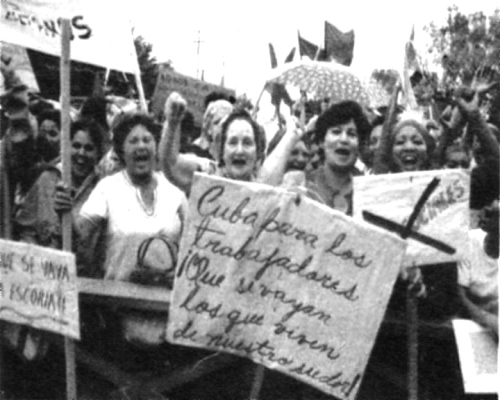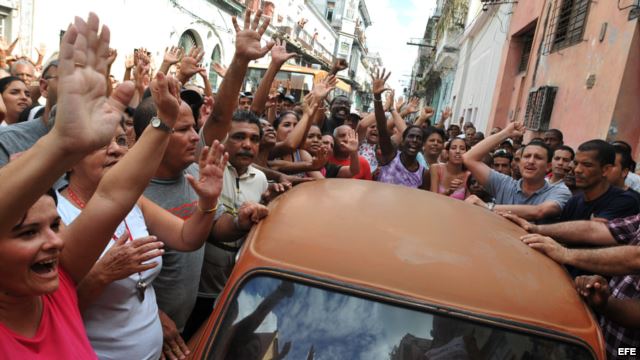
Against the “scum,” acts of repudiation, beatings and humiliations. Against Florida, an invasion of the unemployed
Cubanet.org, Roberto Jesus Quinones Haces, Guantanamo, 1 April 2015 – On the first of April 1980 a bus was driven through the entrance to the Peruvian embassy in Havana; its occupants entered and sought political asylum. Unfortunately, the non-commissioned officer of the PNR (National Revolutionary Police), Pedro Ortiz Cabrera, lost his life in the event. The event was followed by others extremely traumatic for many Cubans due to their violence. All would be indelibly recorded in the nation’s collective memory and would reveal the terrorist nature of the Cuban regime.
Fidel Castro demanded that the Peruvian government immediately hand over the people who had forcibly entered the diplomatic headquarters. To have pleased him, long jail sentences and execution by firing squad undoubtedly would have been the sanctions applied. But the government of Peru did not agree, and the Cuban regime adopted a measure that, like the others taken in those days, made it seem to their proxies that the ball had been placed in the opponent’s court.
The Measures Taken by Fidel
Fidel Castro ordered the withdrawal of protection and monitoring from around the diplomatic headquarters, inciting all Cubans who wanted to emigrate to enter it. Very soon, thousands of people from all the cities and towns of the country crammed into the place turning it into a tangible reservoir of the discontent that now was sapping society.

The increase in the number of countrymen who wanted to emigrate was made evident, and the government, with the objective of discouraging the exits that it had sponsored, made terror its deterrent method par excellence. It was the first time that acts of repudiation were applied on the Cuban public stage. The beatings and humiliations abounded everywhere. The masses, encouraged by powerful groups and directed by individuals of doubtful social behavior, violated the most basic norms of respect for human dignity, and the country lived through several weeks of fascist practices that kept it on edge until the international community strongly protested.
The government demanded the refugees in the embassy and all those who desired to emigrate to present themselves at their places of employment or study in order to be given leave. The unemployed had to seek the document from the CDRs (Committees in Defense of the Revolution). That was the indispensable requisite in order to obtain the exit permit, and it would allow the mobs to intercept the petitioners in order to attack them.
Another Shameless Political Action
Some years had to pass to have access to other reports and above all to read and listen to the irrefutable testimonies on Radio Marti and right here, in order to understand the magnitude of the events and the perversity of the government in those demeaning days of our history.
With the single purpose of getting the advantage in a confrontation where he would always be seen as the victim due to the political, military, economic and moral grandeur of the opponent, Fidel Castro took dangerous offenders from the jails and put them in the embassy in order to create chaos, and then he demanded that the boats that came in search of relatives take these people as well. Together with them travelled not a few mentally ill, it was later learned.
It was a clever move, but of ephemeral value and revealing of the unethical essence of the regime whose immediate objective was to discredit the new emigrants, whom the government elite called “scum.” But also it tried to clean out the Cuban jails and export to the US potential disruptive social elements that Hollywood would portray in popular films like Scarface.
Time Relentlessly Passed
Thirty-five years after these events — which came to be known in the United States as the Mariel Boatlift — many of the Cubans who were catalogued as “scum,” thanks to their honest work and a society that is not perfect but that does guarantee all human liberties, enjoy a life in the US where maybe nostalgia for the home country occupies an important place, but one in which they live according to their way of thinking, with dignity.

The Mariel Boatlift was not a success of the Castro regime; to the contrary. One highly placed leader from that time, Carlos Rafael Rodriguez, admitted to a Mexican magazine that the Revolution had nothing to be proud of with respect to what happened. It is rumored that it was the catalyst for the suicide of Haydee Santamaria and the object of analysis in the farewell letter that Osvaldo Dorticos wrote to Fidel Catro before dying from another gunshot. It was a Pyrrhic victory that very soon lost the artificial shine of the trappings that the Castro regime figureheads dished out in order to praise the supposed genius of the leader. His abuses, still unpunished crimes and inequities were unmasked to reveal the fascist essence of the methods used by the mobs encouraged and supported by the police and political leaders.
Since then the acts of repudiation against officially disfavored diplomatic headquarters and the peaceful opposition, especially the extraordinary Ladies in White and the brave members of the Patriotic Union of Cuba (UNPACU), are still practiced in the streets and before the homes of those harassed.
This, together with repression and constant vigilance by the state security forces as well as the government’s refusal to respect political and fundamental civil rights, shows that state terrorism is a practice entrenched in the Castro regime. The Americans should not forget it, especially now when, behind the abundant dividends, they try to remove Cuba from the list of state sponsors of terrorism.
About the author
 Roberto Jesus Quinones Haces was born in the city of Cienfuegos September 20, 1957. Law graduate. He was sentenced in 1999 in an unfair and illegal way to eight years incarceration and since then has been prohibited from practicing as a lawyer. He has published the books of poetry “The Flight of the Deer” (1995 Editorial Oriente), “Written from jail” (2001, Ediciones Vitral), “The Folds of Dawn” (2008, Editorial Oriente) and “The Water of Life” (2008 Editorial El Mar y La Montana). He got the Vitral Grand Prize for Poetry in 2001 for his book “Written from Jail” as well as Mention and Special Recognition by the Nosside Juried International Poetry Competition in 2006 and 2008, respectively. His poems appear in the UNEAC Anthology of 1994, in the Nosside Competition Anthology of 2006 and in the selected ten-line stanzas “This Jail of Pure Air” produced by Waldo Gonzalez in 2009.
Roberto Jesus Quinones Haces was born in the city of Cienfuegos September 20, 1957. Law graduate. He was sentenced in 1999 in an unfair and illegal way to eight years incarceration and since then has been prohibited from practicing as a lawyer. He has published the books of poetry “The Flight of the Deer” (1995 Editorial Oriente), “Written from jail” (2001, Ediciones Vitral), “The Folds of Dawn” (2008, Editorial Oriente) and “The Water of Life” (2008 Editorial El Mar y La Montana). He got the Vitral Grand Prize for Poetry in 2001 for his book “Written from Jail” as well as Mention and Special Recognition by the Nosside Juried International Poetry Competition in 2006 and 2008, respectively. His poems appear in the UNEAC Anthology of 1994, in the Nosside Competition Anthology of 2006 and in the selected ten-line stanzas “This Jail of Pure Air” produced by Waldo Gonzalez in 2009.
Translated by MLK
